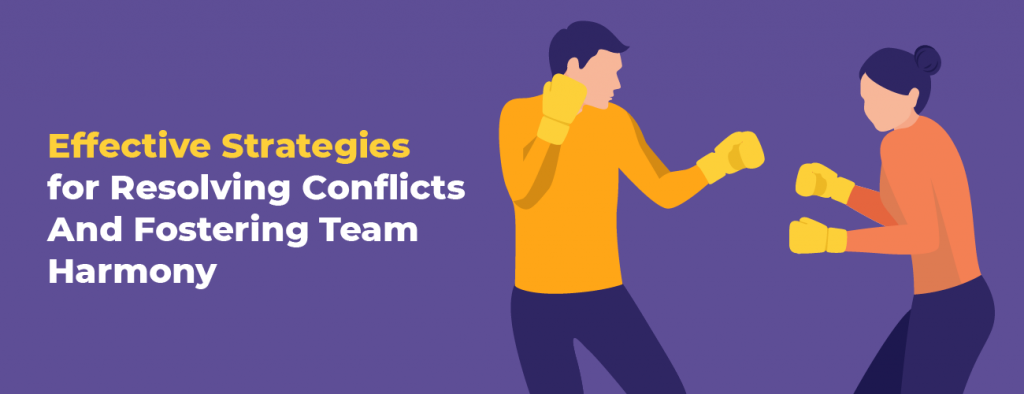
“Nine times out of ten, an argument ends with each contestant more firmly convinced than ever that he is right. You can’t win an argument. You can’t because if you lose it, you lose it; if you win it, you lose it.” — Dale Carnegie.
As individuals collaborating in a workplace, we belong to different cultures, personalities, and belief systems, and the hard-hitting truth is that we are susceptible to conflicts.
In the dynamic, multicultural corporate world, have you ever considered the value of differing opinions and the lack of boundaries they come with? Disagreements can spark workplace conflicts but can also be catalysts for team collaboration and performance improvement.
Remember that time when deciding how to deliver a pitch had a series of iterations? Were parts of what you pitched selected after the iterations? Did it feel like you belonged there? If so, then that is what acted as an instrumental reinforcement when you rolled that idea on the table.
The clash of ideas can lead to innovative solutions and foster a team-oriented approach to problem-solving. Thriving workplaces are created when leaders practice and promote crisis management skills by being the bridge and leading by example.
What Causes These Conflicts At Workplaces?
Conflicts often arise in workplaces where individuals with diverse backgrounds, experiences, and viewpoints come together to problem-solve, brainstorm, and collaborate on projects. Learning to navigate such situations is where an individual’s learning curve begins by offering and receiving feedback.
In any relationship or workplace, it’s essential to consider potential challenges like misunderstandings, differing opinions, biases, learning styles, and perceptions of unfairness.
Research states that approximately 25% of employees have witnessed absenteeism or sickness due to conflicts at work, which directly affects productivity. We can work towards better communication and understanding by being mindful of these.
Dreaming of a work environment with fewer conflicts? Adopting conflict management strategies can help us get started. Studies show that organizations with effective conflict management have 67% of employees highly engaged and motivated, leading to a more productive work environment.
Why do Conflict Management skills matter?
Motivated teams that believe in the power of collaboration and practice effective conflict-management strategies are 21% more successful. Boosting morale through conflict management helps keep the team afloat and work more clearly. This connection between motivation, productivity improvement, and conflict management underscores the importance of these strategies in achieving team success.
Understanding our colleagues’ working styles can be tricky, but we’ll get there. Displaying leadership in multicultural teams can help employers learn about the strengths of employees in the organisation. Do you work with a questioner, an obliger, or a rebel? It’s simple. Listen to them, respect their thoughts, and find common ground.
A coin is two-sided, and so is conflict. Leaders must teach and coach employees to hear both sides of a story and work through conflict as a team. That is the thumb rule for conflict resolution strategies.
How do we practise these skills?
Handling and resolving conflict is a crucial skill that every leader must continually develop to retain peer trust and dignity, even when heated discussions spur. Introducing Conflict Management Training Programs is one step towards ensuring the mental well-being of your employees, which will act as an excellent source of productivity.
Here are some skills to help you get started:
- Trial And Error: Encourage peers to adjust strategies and identify unmet needs by asking: What do I need? Why is it important? How would things be different if I got what I needed?
- Positive language: We don’t have to agree with our peers but must focus on understanding their origin. Try changing those “I hear you, but” statements into “Yes, I understand” statements that build off one another rather than sidelining. Building a positive work environment begins with being positive and energised with your employers. You are the culture!
- Focus On The Present: The past only has room for lessons, not blame. Let go of pent-up emotions and focus on showing the willingness to compromise and collaborate by steering clear of personal biases.
- Open communication: A leader encourages openness and enables team members to learn as much as possible about the problem. In dealing with conflict, note the other person’s phrasing and respond using the exact wording.
- Discuss Resolution Options: Collaborate on solutions, considering both perspectives. Begin by practicing empathy, putting yourself in the other person’s shoes, and considering perspectives.
What Are The Benefits Of Conflict Management Skills:
- Improved decision-making promotes effective choices under pressure.
- Strengthened leadership skills and enhanced competence and trustworthiness.
- Strategic planning with the emotional intelligence of better anticipation and mitigation of risks.
- Boosted morale and productivity from seeing effective crisis plans add to the confidence in employees
- Skills training increases employee engagement and instils a sense of value by empowering colleagues.
Conflict management skills are crucial for fostering collaboration, boosting productivity, and enhancing organizational leadership skills, which are assets.
By embracing these strategies and improving workplace communication, employees and leaders can transform disagreements into opportunities for growth and innovation. Workplace diversity and inclusion are appreciated by many employees, especially freshers. As employers building a culture of relevance is pivotal and if you are from such a hood then we have what it takes to transform your workspaces. Click here to learn more about our business offerings.



